constituent assembly of india debates (proceedings)- volume vii
constituent assembly of india debates (proceedings)- volume vii
constituent assembly of india debates (proceedings)- volume vii
Create successful ePaper yourself
Turn your PDF publications into a flip-book with our unique Google optimized e-Paper software.
The introduction <strong>of</strong> kuth cultivation in Lahaul has brought it some economic prosperity but the West<br />
Coast islands are probably no better <strong>of</strong>f than they were ten or twelve years ago, and in the Chittagong<br />
Hill Tracts no great impetus to enlightenment is perceptible. On the other hand, in the partially excluded<br />
areas also little improvement is as yet visible although in Bombay an inquiry into the conditions <strong>of</strong> the<br />
aboriginals was started as early as 1937. A Backward Class Department and Board have also been<br />
functioning in Bombay. Other provinces have since taken the cue and welfare work now seems to be<br />
forging ahead but it is perhaps the general interests in the backward classes which is responsible rather<br />
than the system <strong>of</strong> partial exclusion as such. The remarks <strong>of</strong> the Orissa Government are <strong>of</strong> interest:" The<br />
system <strong>of</strong> partial exclusion has also been a most unsatis-factory constitutional device. In matters <strong>of</strong><br />
administration <strong>of</strong> the partially excluded areas, the Ministers tender advice to the Governor, with whom<br />
the ultimate responsibility for the good Government <strong>of</strong> these areas rests. He may accept or reject such<br />
advice. The system suffers from a fundamental defect; the responsibility is shared between the<br />
Governor, and the Ministry answerable to the people <strong>of</strong> this country or their elected representatives." No<br />
less responsible is perhaps the fact that the representatives <strong>of</strong> the partially excluded areas have not been<br />
capable <strong>of</strong> bringing sufficient pressure and influence to bear on the Ministry. Further, some <strong>of</strong> the<br />
partially excluded areas which constitute small pockets in large districts and constituencies could<br />
apparently be lost sight <strong>of</strong> and their interests subordinated to those <strong>of</strong> the larger areas in which they<br />
were contained. Some <strong>of</strong> the C. P. excluded areas situated in the Chhindwara and Bilaspur districts may<br />
be particularly noticed in this connection. They constitute comparatively small islands <strong>of</strong> partial exclusion<br />
which have little voice in a large constituency. The greatest weakness <strong>of</strong> the scheme <strong>of</strong> partial exclusion<br />
is perhaps the fact that it left areas weakly or only nominally represented in the legislature without any<br />
special financial provisions. Whatever the reasons may be, the conclusion to be drawn from the state <strong>of</strong><br />
affairs noticed by us is that partial exclusion or exclusion has been <strong>of</strong> very little practical value. There has<br />
been neither educational nor economic development on any appreciable scale. The object <strong>of</strong> special<br />
administration has thus not been achieved, and it is clear that if the hill tribes are to be brought up to<br />
the level <strong>of</strong> the rest <strong>of</strong> the population the strongest measures are now necessary.<br />
6. ATTITUDE OF THE GENERAL PUBLIC -<br />
One thing which we noticed in the course <strong>of</strong> our visits to the different Provinces was a considerable<br />
awakening <strong>of</strong> the public conscience in the matter <strong>of</strong> the welfare <strong>of</strong> the tribal people. The inquiries<br />
instituted in some <strong>of</strong> the Provinces have doubtless contributed to this quickening. Non-<strong>of</strong>ficial<br />
organisations are beginning to take interest in the welfare <strong>of</strong> the tribes and the work <strong>of</strong> the Servants <strong>of</strong><br />
India Society stands out prominently among these. The recent rising <strong>of</strong> the Warlis in Bombay Presidency<br />
has drawn attention in a rather forcible way perhaps, to their problems. Whatever the reasons, is seems<br />
now clear that there is a general tendency to take up the question <strong>of</strong> development <strong>of</strong> the tribes people as<br />
a serious matter, but whether this by itself is sufficient to ensure the future well-being <strong>of</strong> the tribes is<br />
more than questionable. Most <strong>of</strong> the Provinces are far from being happily placed in the matter <strong>of</strong> funds,<br />
and the development <strong>of</strong> areas inhabited by tribes which are situated generally in hilly country is a matter<br />
which calls for a good deal <strong>of</strong> expenditure for which there are many competitors. The emergence <strong>of</strong><br />
educated people among the tribes is as yet inadequate for the maintenance <strong>of</strong> interest in their problems.<br />
7. POTENTIALITIES OF THE TRIBES -<br />
The views <strong>of</strong> people <strong>of</strong> different points <strong>of</strong> view regarding the future administration <strong>of</strong> the hill tracts<br />
and <strong>of</strong> the tribes people themselves was found to be remarkably uniform. To begin with, there was<br />
hardly anybody who did not believe that the tribals are capable <strong>of</strong> being brought to the level <strong>of</strong> that rest<br />
<strong>of</strong> the population by means <strong>of</strong> education and contact. Wherever facilities for education and contact have<br />
been available, the tribes people have showed that their intelligence can be developed and<br />
environmental difficulties overcome. It is true that as yet there is a great deal <strong>of</strong> apathy in certain areas.<br />
Mr. Symington's report in particular points out that the Bhils take little interest in the local boards or in<br />
education and their addiction to drink is likely to keep them in their present backward state. In the


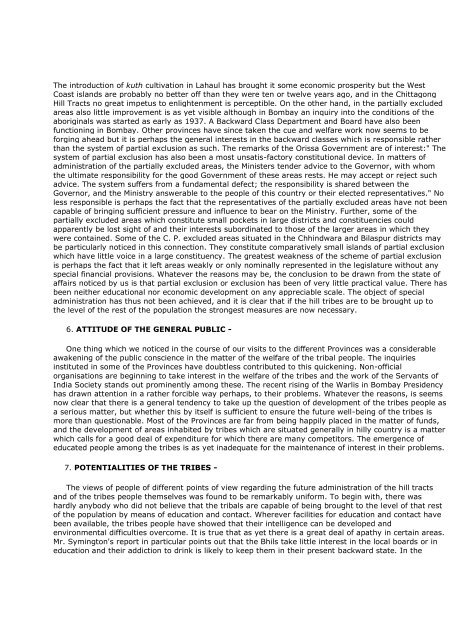

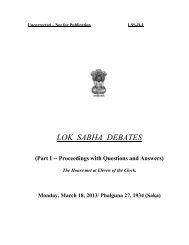
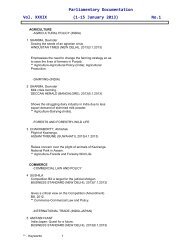
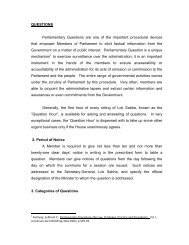
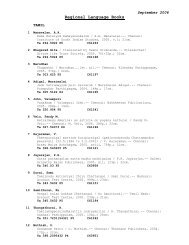
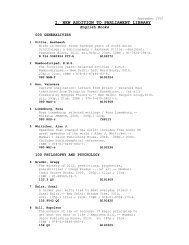
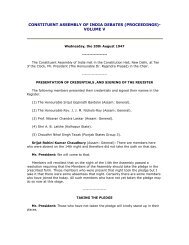

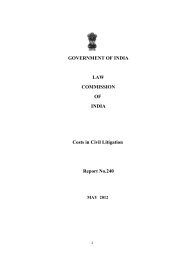
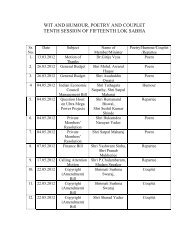
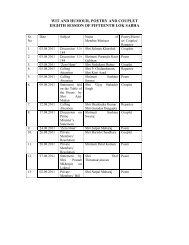

![gÉÉŌ A.]ÉŌ. xÉÉxÉÉ](https://img.yumpu.com/8015720/1/190x245/geeo-aeo-xeexee.jpg?quality=85)
